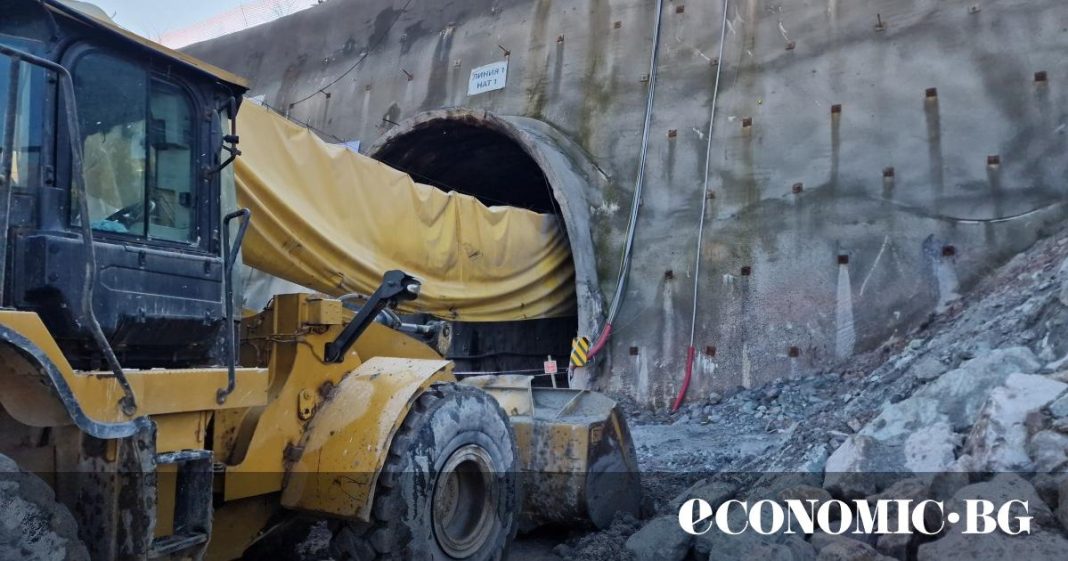The key analysis by the University of Architecture, Civil Engineering and Geodesy (UACEG) and the Mining and Geology University is expected to be ready by July 14 – 15, providing clarity on how construction will continue on Bulgaria’s longest railway tunnel, located near Vakarel. Despite serious geological problems, the National Railway Infrastructure Company (NRIC) will do everything possible not to delay the project, assured project manager Eng. Krum Palapuov.
However, there will certainly be additional costs, and it is questionable whether the new reinforcement will be carried out by the Turkish consortium “Jen-Dui Railway Elin Pelin,” which is the current contractor for the Elin Pelin – Kostenets section.
“There is no turning back”
Palapouov is adamant that despite the difficulties, “there is no turning back.” Of the 13,200 meters of total tunnel length, 4,600 meters have already been dug. “We have already reinforced the fasteners once, and it will obviously be necessary to reinforce them a second time,” he explained, referring to the need for new, more serious reinforcement.
The academic community is working on it, and I expect the analysis by Monday or Tuesday, July 14 or 15, as we are under a lot of time pressure.“
He is optimistic that the right path for reinforcement has been found. “We have built a test section that is almost 170 meters long, and this test section is currently showing results.”
When asked about possible delays and cost increases for the project, Eng. Palapuov stated that “as of today, what I can say categorically is that we will in any case try not to delay the project, but given the reinforcement, there will certainly be cost increases.”
A new public tender for the reinforcement?
The question of who will carry out the new reinforcement is of key importance. Eng. Palapuov confirmed that due to the limits for unforeseen works under the current contract being reached, a new procedure will most likely be necessary.
Thus, the current contractor will most likely not carry out the reinforcement itself.
If a new procedure is announced, we cannot stop anyone from participating. This is the principle of equal treatment and the principle of competition, which apply throughout the European Union.“
The funding for this new reinforcement will not come from European operational programs, but the funds will have to be provided from the national budget. Eng. Palapuov commented that there are also mechanisms for renegotiation under European programs, and the managing authority of the operational program can say whether this will be possible.
The project manager stated that payments to contractors are made on time, especially those related to completed activities. There has been a delay in the payment of indexations, but they are expected to be paid in full by mid-July.
Background: attempts at reinforcement and significant cost increases
The problems with the Vakarel tunnel are not new. They were known about two years ago, but were only officially announced in March 2023 by Transport Minister Grozdan Karadzhov. He revealed that the initial design had provided for minor reinforcement, which proved ineffective due to unforeseen geological difficulties – mainly soft clay and sandy soil.
As a result, additional reinforcement was undertaken about two and a half years ago, which also failed to produce the desired effect. Subsequently, a “third design” was required with a new type of reinforcement, including the installation of new anchors and heavier fasteners in a 50-meter section. This method, which has not shown any deformation so far, must be applied along the entire length of the tunnel.
The large-scale modernization of the Elin Pelin – Kostenets railway line has already become dramatically more expensive, with an increase of over BGN 122 million excluding VAT between 2022 and the end of 2024. This amount includes indexation, copyright agreements, and decisions for additional tunnel reinforcement. As our media has already reported, the latest reinforcement alonecosts over BGN 71 million.
The Elin Pelin – Vakarel section (lot 1), which includes the construction of tunnels, is the most significantly overpriced, with over BGN 100 million excluding VAT. The initial contract worth BGN 498.8 million excluding VAT has already reached over BGN 599.5 million excluding VAT, which represents an increase of over 20%. The contractor for this lot is the Turkish consortium “Cen-Dui Railway Elin Pelin.”
The modernization of the Elin Pelin – Kostenets railway section is the largest project financed under the Operational Program “Transport and Transport Connectivity,” with a total value of BGN 1.3 billion, including national co-financing. The ambition is to complete the railway line from Sofia to Burgas by 2030.
“A major engineering achievement”
The project for the modernization of the Elin Pelin – Kostenets railway line, part of the Sofia-Plovdiv route, has been described by Eng. Palapuov as “a truly major engineering achievement” due to the extremely challenging terrain. The section, with a length of about 52 kilometers of double railway line, passes through the gorge of the Maritsa River, through the hills and the defile between Kostenets. This requires the construction of numerous large engineering structures.
According to Eng. Palapuov, Tunnel 1, with a total length of 1,940 meters for both tubes, has already been excavated and a large part of it has been finished with secondary lining. He also highlighted other structures that make the project “unique”: 24 bridges, a viaduct, and flyovers. Among them is the 750-meter viaduct after Momina Pass, which will be built using active thrust technology. Construction has also begun on this viaduct, described as “a truly great challenge, a serious engineering structure” that crosses the Maritsa River and Road I-8.
In total, of the nearly 21 kilometers of tunnels along the route, about 10 kilometers have already been dug, and some of them have already been lined.
The modernization also includes the reconstruction of the Elin Pelin and Ihtiman stations, the construction of separate traction substations and stops, as well as the modernization of the route-computer centralization system.
Translated with DeepL.
Източник: Economic.bg


